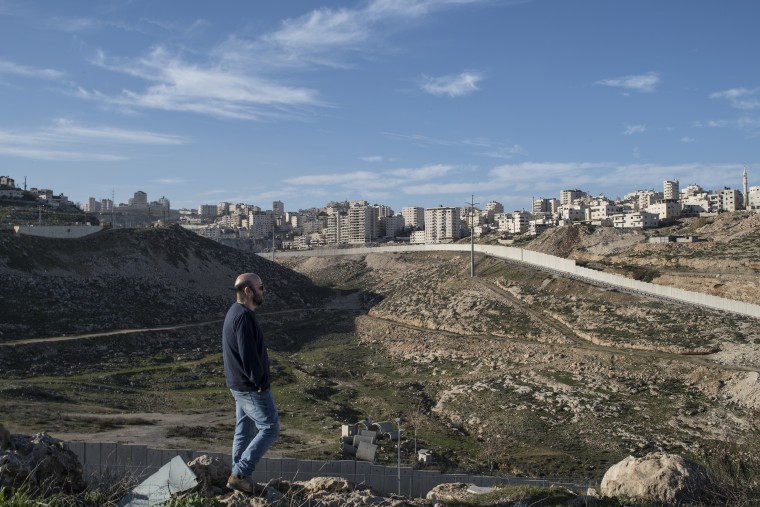Podcasts
I've always been a fan of the radio. "Radio" today includes podcasts, basically audio programs available on the internet that we can listen to any time we want. Some of them never air on the radio at all. I have two podcasts to recommend here.NPR's Snap Judgement - "Turncoat"
In this episode, an Israeli solider is feeling anything but proud and has an impossible decision to make. When Dean Issacharoff was a commander in the Israeli Defense Forces, he patrolled the Palestinian city of Hebron and later fought in Gaza. After he got home from the army, Dean made a decision to go public and joined Breaking the Silence to speak about his violent actions. In a twisting turn of events those actions from the past came back to haunt him. Listen at this link.
Shehada Street, Hebron, closed to Palestinians
--
Reveal, from the Center for Investigative Reporting, presents "The Right to Boycott."
Supporters like me say that Boycott, Divestment and Sanctions (BDS) is a nonviolent protest to pressure the Israeli government over its treatment of the Palestinian people. Opponents say its goal is to eliminate Israel as a Jewish state.

Several U.S. states (including my own, Texas) "...have tried to stop BDS by banning boycotts of Israel. We look at where this legislation comes from and weigh it against the First Amendment right to free speech.
"Then we travel to the occupied Palestinian territories to meet a man who wanted to protest the Israeli occupation by starting a purely Palestinian business. His answer was to start a mushroom farm. After initial success, he ran into unexpected challenges."
For a good explanation of the way these state laws affect individuals and businesses, click this link to listen.
--
In other news... This report makes me nervous.
Like the Ibrahimi Mosque in Hebron, Jerusalem’s Al-Aqsa Mosque is also under threat
"Although OCHA does not document Israeli attacks on Palestinian holy sites specifically, two of these have been under attack for many years. The Ibrahimi Mosque is in Hebron and is also known as the Tomb of the Patriarchs; it sits in the centre of the city which has been taken over by the Israeli occupation authorities, which now control access to the mosque. The local Palestinians resisted attempts by illegal settlers planted in the city after the 1967 war to control the mosque. The occupation authorities, though, took actual control of the site after a Jewish terrorist-settler massacred 29 Muslim worshippers on 25 February 1994 before he was overpowered and killed.
"The Israeli authorities then closed the mosque and divided it into an area for Muslims and another for Jews. On the days of Jewish or Muslim festivals, the authorities only allow Jews or Muslims to pray in the mosque." (...)
"Palestinian fears about a full Israeli takeover of Al-Aqsa are entirely justified. They remember the closure imposed by Israel following an attack on security forces at one of the mosque’s entrances, and that the state installed security gates at the main gate used by worshippers. Palestinians refused to accept any changes to their access rights and protested through peaceful prayer for two full weeks, forcing the Netanyahu government to remove the gates.
"This was a blatant attempt by Israel to change the status quo that has existed since Jerusalem and its holy sites were occupied in 1967." Read the full article at this link.
--
And... See this important report from Al-Haq.
Occupying Jerusalem’s Old City: Israeli Policies of Isolation, Intimidation, and Transformation [Al-Haq is an independent Palestinian human rights NGO based in Ramallah, established in 1979 to protect and promote human rights and the rule of law in the Occupied Palestinian Territory (OPT).]
'Following the start of the occupation in 1967, Israel moved to annex East Jerusalem and establish the city, alongside annexed West Jerusalem, as its `united capital.' Since that time, Israel has worked to entrench its control over Jerusalem, instituting a variety of policies and practices that aim to drive Palestinians out of the city while acquiring land and property in the process. As a result, the Old City, the heart of Jerusalem, has suffered from the same issues as other Palestinian neighborhoods in the city.
"This includes, in part, the confiscation of property, a discriminatory planning regime and inadequate services, the transfer of Israeli settlers, the targeting of Palestinian institutions, the targeted de-development of the economy, and harassment by Israel’s municipal authorities."
Al-Haq’s new report “Occupying Jerusalem’s Old City: Israeli Policies of Isolation, Intimidation, and Transformation” seeks to highlight some of the seen and unseen, widespread and systematic policies that Israel uses to deepen its control over the Old City, resulting in the forcible displacement of Palestinians there.
Click this link to reach the report, then scroll up. The website is http://www.alhaq.org/.
-- --
To
receive regular bulletins from Ann Hafften, sign up at my blog - A Texas
Lutheran's Voice for Peace: http://www.voicesforpeace.blogspot.com/








